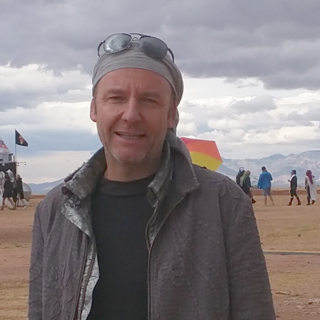This article may require cleanup to meet Wikipedia's quality standards. The specific problem is: WP:PARTIAL.(January 2025) |
Ensemble may refer to:
This article may require cleanup to meet Wikipedia's quality standards. The specific problem is: WP:PARTIAL.(January 2025) |
Ensemble may refer to:

In statistical mechanics and mathematics, a Boltzmann distribution is a probability distribution or probability measure that gives the probability that a system will be in a certain state as a function of that state's energy and the temperature of the system. The distribution is expressed in the form:
Dynamics or dynamic may refer to:
Electronic music broadly is a group of music genres that employ electronic musical instruments, circuitry-based music technology and software, or general-purpose electronics in its creation. It includes both music made using electronic and electromechanical means. Pure electronic instruments depended entirely on circuitry-based sound generation, for instance using devices such as an electronic oscillator, theremin, or synthesizer. Electromechanical instruments can have mechanical parts such as strings, hammers, and electric elements including magnetic pickups, power amplifiers and loudspeakers. Such electromechanical devices include the telharmonium, Hammond organ, electric piano and electric guitar.

In machine learning, a neural network is a model inspired by the structure and function of biological neural networks in animal brains.
In physics, statistical mechanics is a mathematical framework that applies statistical methods and probability theory to large assemblies of microscopic entities. Sometimes called statistical physics or statistical thermodynamics, its applications include many problems in the fields of physics, biology, chemistry, neuroscience, computer science, information theory and sociology. Its main purpose is to clarify the properties of matter in aggregate, in terms of physical laws governing atomic motion.

An academic discipline or field of study is a branch of knowledge, taught and researched as part of higher education. A scholar's discipline is commonly defined by the university faculties and learned societies to which they belong and the academic journals in which they publish research.
State most commonly refers to:

Theoretical computer science is a subfield of computer science and mathematics that focuses on the abstract and mathematical foundations of computation.
Neuromorphic computing is an approach to computing that is inspired by the structure and function of the human brain. A neuromorphic computer/chip is any device that uses physical artificial neurons to do computations. In recent times, the term neuromorphic has been used to describe analog, digital, mixed-mode analog/digital VLSI, and software systems that implement models of neural systems. Recent advances have even discovered ways to mimic the human nervous system through liquid solutions of chemical systems.

Peter V. Coveney is a British chemist who is Professor of Physical Chemistry, Honorary Professor of Computer Science, and the Director of the Centre for Computational Science (CCS) and Associate Director of the Advanced Research Computing Centre at University College London (UCL). He is also a Professor of Applied High Performance Computing at University of Amsterdam (UvA) and Professor Adjunct at the Yale School of Medicine, Yale University. He is a Fellow of the Royal Academy of Engineering and Member of Academia Europaea. Coveney is active in a broad area of interdisciplinary research including condensed matter physics and chemistry, materials science, as well as life and medical sciences in all of which high performance computing plays a major role. The citation about Coveney on his election as a FREng says: Coveney "has made outstanding contributions across a wide range of scientific and engineering fields, including physics, chemistry, chemical engineering, materials, computer science, high performance computing and biomedicine, much of it harnessing the power of supercomputing to conduct original research at unprecedented space and time scales. He has shown outstanding leadership across these fields, manifested through running multiple initiatives and multi-partner interdisciplinary grants, in the UK, Europe and the US. His achievements at national and international level in advocacy and enablement are exceptional".
Processor may refer to:
Diego Masson is a French conductor, composer, and percussionist.

Hartmut Neven is a German American scientist working in quantum computing, computer vision, robotics and computational neuroscience. He is best known for his work in face and object recognition and his contributions to quantum machine learning. He is currently Vice President of Engineering at Google where he leads the Quantum Artificial Intelligence Lab, which he founded in 2012.
In statistics and machine learning, ensemble methods use multiple learning algorithms to obtain better predictive performance than could be obtained from any of the constituent learning algorithms alone. Unlike a statistical ensemble in statistical mechanics, which is usually infinite, a machine learning ensemble consists of only a concrete finite set of alternative models, but typically allows for much more flexible structure to exist among those alternatives.

Quantum machine learning is the integration of quantum algorithms within machine learning programs.

Branko Souček was a Croatian academic and computer scientist who authored the first Croatian-made digital computer and the first computer paper in 1959. Souček founded the first laboratory of Cybernetics. Souček and IRIS are the authors and editors of ten books presenting the Sixth Generation Projects results.
Google Neural Machine Translation (GNMT) was a neural machine translation (NMT) system developed by Google and introduced in November 2016 that used an artificial neural network to increase fluency and accuracy in Google Translate. The neural network consisted of two main blocks, an encoder and a decoder, both of LSTM architecture with 8 1024-wide layers each and a simple 1-layer 1024-wide feedforward attention mechanism connecting them. The total number of parameters has been variously described as over 160 million, approximately 210 million, 278 million or 380 million. It used WordPiece tokenizer, and beam search decoding strategy. It ran on Tensor Processing Units.
The following outline is provided as an overview of, and topical guide to, machine learning:
LP Duo is a piano and electronic duo whose members are pianists, composers, and innovators Sonja Lončar and Andrija Pavlović based between Amsterdam and Belgrade. Formed as a traditional chamber ensemble performing classical music, the duo is now active in the fields of electronic, avant-garde, film, television, theater and popular music, both as performers and composers. More recently, LP Duo has been particularly involved with Quantum Music, an experimental genre that seeks to explore the connections between quantum physics and music.